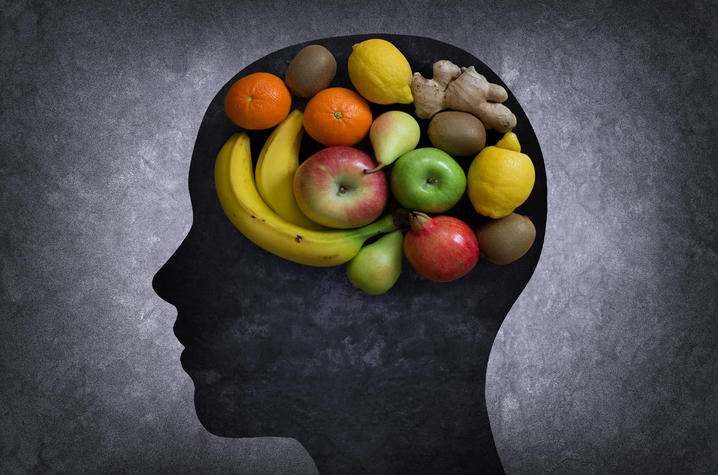Boost your brain: the power of a healthy diet

The University of Kentucky Public Relations & Strategic Communications Office provides a weekly health column available for use and reprint by news media. This week’s column is by Lauren Batey, a program coordinator for the Food as Health Alliance.
LEXINGTON, Ky. (Aug 5, 2024) – Recent research has shown that our diet plays a crucial role in maintaining not just our physical well-being, but also our brain health. A diet high in sugars and processed foods can weaken brain function and negatively impact mental health. Your brain requires healthy foods like fruits, vegetables, whole grains, fish and lean meat to keep it running smoothly.
The brain and gut share significant connections through a pathway called the gut-brain axis. The vagus nerve links your brain and stomach, allowing them to communicate directly. Your gastrointestinal tract is sometimes nicknamed the “second brain” due to this connection. This link can be seen in our daily lives; whenever you experience “butterflies in your stomach,” you are feeling that connection firsthand.
Additionally, the microbiome full of microscopic organisms living in our gut can significantly impact our mood and mental health. These organisms thrive when you consume a diet rich in fiber from whole foods.
Take advantage of the relationship between your diet and brain function and eat these “brain-foods” to increase your mental alertness and mood.
Berries: Berries, blueberries in particular, are rich in flavanols which are linked to improved cognitive function. Flavanols help improve blood flow to the brain. Additionally, the antioxidants in blueberries help protect brain cells from oxidative stress and inflammation. Research has shown a link between regular consumption of berries and decreased risk of certain cognitive disorders such as Alzheimer’s and dementia.
Fish: Omega-3 fatty acids play an important role in promoting a healthy brain. They reduce inflammation and improve communication between brain cells. Omega-3 also helps promote the growth and repair of brain tissue which enhances cognitive function. These healthy fats can be found in seafood like salmon, sardines, mackerel, tuna, cod and oysters.
Leafy greens: Leafy greens are a staple of any healthy diet due to their high nutritional content. Spinach, arugula, kale and collards are rich in vitamins A and C and are high in fiber and folate. Research has shown that regular consumption of leafy greens may lead to a slower rate of cognitive decline and improved memory as you age. Try adding these nutritional powerhouses to whole grain pasta, soups and smoothies to sneak in those extra nutritional benefits.
Nuts: Nuts like walnuts, pistachios and almonds are beneficial to your overall brain health. Almonds are known to help improve memory. Pistachios can help with inflammation and may help with cognition. Walnuts are rich in antioxidants and DHA, a fatty acid that may improve learning ability.
Taking care of your brain health also means taking care of your gut. A healthy and balanced microbiome is connected to reduced risk of various mental health disorders and improved memory and cognition. Care for your gut health by enjoying these foods.
Probiotic foods: Probiotic foods help produce a healthy microbiome, which is responsible for producing chemicals like serotonin and dopamine. These compounds help regulate mood and support brain health. Probiotic foods include yogurt, kimchi, buttermilk, fermented vegetables like sauerkraut, and some cheeses. Studies have shown that regular consumption of probiotic foods is linked to reduced risk of anxiety and depression and enhances memory and learning abilities.
Prebiotic foods: Prebiotic foods such as garlic, onions, and bananas help to nourish beneficial gut bacteria, and in turn, support brain health. These foods help with the production of compounds like short chain fatty acids that play an important role in reducing inflammation to support brain function. To maintain a healthy gut and protect your brain, fuel your microbiome by eating plenty of fiber from fruits and vegetables, whole grains, and legumes like beans or chickpeas. Adults should aim for 25-30 grams per day.
UK HealthCare is the hospitals and clinics of the University of Kentucky. But it is so much more. It is more than 10,000 dedicated health care professionals committed to providing advanced subspecialty care for the most critically injured and ill patients from the Commonwealth and beyond. It also is the home of the state’s only National Cancer Institute (NCI)-designated Comprehensive Cancer Center, a Level IV Neonatal Intensive Care Unit that cares for the tiniest and sickest newborns, the region’s only Level 1 trauma center and Kentucky’s top hospital ranked by U.S. News & World Report.
As an academic research institution, we are continuously pursuing the next generation of cures, treatments, protocols and policies. Our discoveries have the potential to change what’s medically possible within our lifetimes. Our educators and thought leaders are transforming the health care landscape as our six health professions colleges teach the next generation of doctors, nurses, pharmacists and other health care professionals, spreading the highest standards of care. UK HealthCare is the power of advanced medicine committed to creating a healthier Kentucky, now and for generations to come.




